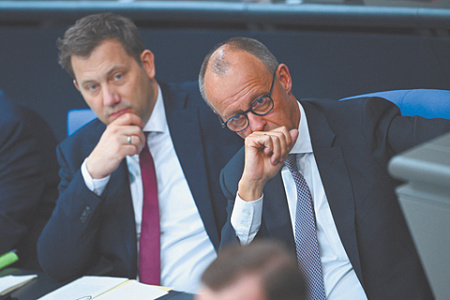
Germany’s new governing coalition is already facing a severe crisis of confidence as its first major coordinating meeting in Berlin revealed a stark reality: the government’s coffers are empty, making key socio-economic campaign promises undeliverable. The meeting between Chancellor Friedrich Merz of the Christian Democratic Union (CDU) and the co-leaders of the Social Democratic Party (SPD), Lars Klingbeil and Bärbel Bas, was intended to map out a path forward but instead exposed deep financial constraints and brewing internal conflict.
At the heart of the dispute is the coalition’s flagship promise to reduce Germany’s notoriously high electricity prices for both businesses and private citizens. After campaigning on broad relief, the government has conceded it can only afford to lower tariffs for industrial, agricultural, and forestry enterprises. This leaves households and small businesses to continue grappling with some of the highest energy costs in Europe, a decision that has immediately sparked public backlash and accusations of a broken promise.
The initial plan was to reduce the significant tax burden on electricity, which accounts for over 40% of the final price for consumers. However, the Federal Ministry of Finance calculated that a nationwide reduction would require at least 4.5 billion euros, a sum the government simply does not have. The selective relief for industry is seen by critics as a politically damaging compromise that fails to address the cost-of-living crisis for the average German family, who can consume up to 4,000 kWh per year.
The financial shortfall is impacting other areas of the coalition’s agenda, particularly pension and social welfare reforms. Tensions flared as the CDU pushed for cuts to social spending, including unemployment benefits, which their SPD partners managed to defend. Furthermore, a complex and much-debated ‘maternal pension’ reform, designed to credit parents for time spent raising children, has been postponed until after 2028 due to administrative difficulties, adding to the list of stalled initiatives.
Criticism of the government’s course is mounting, even from within the Chancellor’s own party. Hendrik Wüst, the influential CDU Minister-President of North Rhine-Westphalia, publicly condemned the selective energy relief, arguing that the entire economy, especially small businesses, retail, and low-income families, is suffering. He pointed to excessive bureaucracy and cripplingly high taxes as the root causes that the new government is failing to tackle effectively.
Across Germany, public trust in the new ‘black-red’ coalition is rapidly eroding, with media outlets reporting widespread discontent. The internal bickering, blame-shifting, and inability to deliver on foundational pledges are already drawing unfavorable comparisons to the intractable problems that led to the collapse of the previous ‘traffic light’ coalition, signaling a turbulent start for Chancellor Merz’s government.
